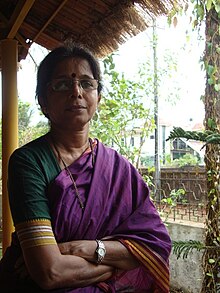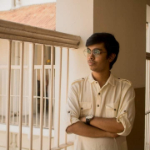INTERVIEWED BY OWSHNIK GHOSH
Vaidehi is a reputed Kannada writer. She has written short stories, novels, poems, drama for children and biographies in her long literary career. She is also a translator. She won Sahitya Akademi Award in the year 2009 for her collection of short stories Krouncha Pakshigalu.
Owshnik: What was the story behind the journey from Janaki to Vaidehi?
Vaidehi: I was the joint secretary of the students’ union in college. Incidentally, have you noticed that girls of that time, always became joint secretaries, and not secretaries? Women are always considered as ‘joint’ entities! To commemorate the International Women’s Day, we organized a special programme. In this programme, I had a strange experience which I wrote as a story and sent to ‘Sudha’, a prominent Kannada Magazine. Later, for some reason, I felt that it was better if it was not published. I wrote to the editor of the magazine to return the story. Instead of sending it back they published it changing the writer’s name from Janaki to Vaidehi. I liked the name and continued my writing under that pseudonym. All those who knew me from my childhood prefer to call me Janaki. In the beginning if anyone called me Vaidehi I would not respond as I was not familiar with that name. But later Janaki and Vaidehi became part and parcel of my soul. Vaidehi helped to write and Janaki helped me to interact in various relations and with characters freely and safely within the private circle.
Owshnik: Was it challenging for you as a woman to become a writer at the time you started?
Vaidehi: For me, there was no question of challenge at all. Everybody in the house was happy that I wrote stories and they were published in magazines. Of course, as each one in the house was busy in their own world, they did not bother much about my earlier writing.
Owshnik: Your stories mostly deal with the life, psychology, and problems of women (mostly belonging to the middle class) in our society. Was it a conscious decision to write mostly on women characters?
Vaidehi: I am a writer who has come from a vibrant family life, and not with much reading or literature study or literature degree. I was and is in women’s world, in the inner courtyard. Whatever I experienced directly or indirectly got reflected in my writing naturally. It was not a conscious decision. Conscious decisions cannot make good writing.
Owshnik: You started writing during the Navya movement of Kannada literature. How did that literary movement influence your works? And how did you keep your writings different from those of other male writers of the movement?
Vaidehi: I cared not much about the literary movement of my time. In fact, I was not at all interested in them. What I wanted was to write about women’s sufferings. My childhood was spent during a time when big families with lots of children was a norm. Family planning was never heard of then. And later when family planning stepped into the society both men and women were thinking of it as a sin. In a way, I was fortunate to grow up in the midst of many big families – besides my own and many of my friends and relatives. This made me observe the complexity of life, unknowingly, very closely. By the word life I mean mainly women’s life. So, explaining ‘Keeping my writing different from that of other male writers’, or ‘movements influencing my writing’ is irrelevant.
Owshnik: According to you what is the definition of ‘aesthetics’ in literature?
Vaidehi: In our place there is a saying ‘can you talk just because you know to talk?’- In the same way, just because one knows how to write one cannot write according to one’s whims and fancies. That writing is a wonderful art must not be ignored. The capacity to write should not be abused. Each writer’s writing has its own aesthetics without which it cannot be considered as good and sensible literature.
Owshnik: Why did you think to write stories on Mahakavyas?
Vaidehi: I have written only two stories based on the incidents of Mahakavyas. One is ‘An Afternoon with Shakuntala’ based on Shakuntalopakhyana in Mahabharatha and the other is ‘Krouncha Pakshigalu’. The Ramayana starts with the death of one of the Krouncha birds and the cry of separation of the other. The agonies of these two stories are everlasting and ever inspiring. We can reinterpret innumerable stories found in the Mahakavyas relating them to the present time. Importantly, we must have acute need to revisit them through our writing and not just for the sake of rewriting them.
Owshnik: How do you balance between “Vaidehi the poet” and “Vaidehi the prose writer”?
Vaidehi: The question of balancing does not arise. Both are thick friends interconnected with one another. Both write literature — sometimes in prose, sometimes in verse.
Owshnik: Why did you choose to write for children? Do you think it is more difficult to write for children than for adults?
Vaidehi: I had no idea that I could write for children. Once Sri K. V. Subbanna asked me to write a drama for children for Ninasam, a famous theatre school in Heggodu (in Shimoga district of Karnataka). That was the beginning. As I had grown up in the midst of ‘an army’ of children, I found it easy to enter into their world. From then on, I have written seventeen children’s plays – some original, some translations and some adaptations. They include Shakespeare’s The Tempest and Macbeth! They were staged super successfully all over Karnataka, to my surprise. I believe that it was all because the child within me is still alive. It is awakened whenever I beckon it and directs me how to write songs, stories and dramas. Thanks to the great Sri K.V. Subbanna, the Magsaysay Awardee. Through his publication called ‘Akshara prakashana’ he has published many of my works and after him, his son Askhara continues to do it.
Owshnik: What are your views on contemporary Kannada children’s literature?
Vaidehi: It’s getting new vistas. Today’s children are far different from the 20th century children due to their multifaceted exposure. Of course, this is a worldwide phenomenon. Accordingly, the literature for them is changing and rightly so. The demand of the time is not just simple stories or fantasies but experimentation of introducing science and technologies through stories. This seems to be happening in Kannada Children’s literature.
Owshnik: Besides being a writer, you also translated some literary works into Kannada. How was your experience as a translator?
Vaidehi: It’s not a mere recreation of original text into another language. Translating nuances of the original language into another without losing its fragrance is not an easy task. It demands tremendous parishrama. But in doing it we are rewarded with immense pleasure.
Owshnik: Would you call yourself a Kannada writer first, then an Indian writer, or vice versa?
Vaidehi: I am an Indian writer in the broad sense, writing in one of the Indian languages, that is Kannada. In that way, I am a Kannada writer first. Though I love all the languages and literature of my country I give the first and the foremost place to my mother tongue, the Kannada language and Kannada literature.
Also, read Book review of Ramesh Karthik Nayak’s Chakmak by Owshnik Ghosh and published in The Antonym:
Book review of Ramesh Karthik Nayak’s Chakmak— Owshnik Ghosh
Follow The Antonym’s Facebook page and Instagram account for more content and interesting updates.



























0 Comments